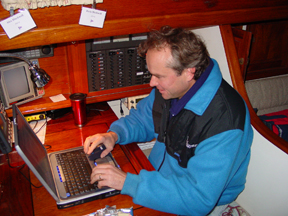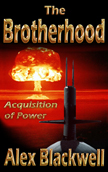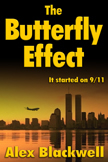 |
![]()
Book 1
The Butterfly Effect
It Started on 9/11
Book 2
The Brotherhood
Acquisition of Power
Book 3
Supremacy
What Motivated Alex Blackwell to write?
21 Questions for Alex
![]()
Non Fiction
Happy Hooking - the Art of Anchoring
Fiction
![]()
Media Center
=
Crowd Sourced Editing
=
Co-Branding
![]()
Twenty(one) questions for the author
 Alex Blackwell, author of The Butterfly Effect: It started on 9/11, reveals how he came to write the book and what his plans for the future are. The Butterfly Effect mixes fact with fiction to build a thriller of massive proportions, detailing what led up to 9/11 and what may yet transpire as a consequence of this horrific event. It also touches on Irish immigration to the US and draws from his sailing experiences.
Alex Blackwell, author of The Butterfly Effect: It started on 9/11, reveals how he came to write the book and what his plans for the future are. The Butterfly Effect mixes fact with fiction to build a thriller of massive proportions, detailing what led up to 9/11 and what may yet transpire as a consequence of this horrific event. It also touches on Irish immigration to the US and draws from his sailing experiences.
- What made you write this book?
I love reading and have always been fascinated by multi-threaded novels; stories with multiple plots that are inextricably intertwined. Life is like that. You live your life, but your story touches other people’s stories. Your actions will affect theirs and visa-versa. What befuddled me is how to invent, or rather put to paper, a story-line that mimicked reality in this way. Then again, reality does often mimic a story.
- How did you come up with this particular idea?
My wife, Daria, and I were living in northern New Jersey within 20 miles of the World Trade Center in Manhattan on 9/11. Everyone in the area, along with so many others in the world, was deeply affected by this event. So, that part was in me and wanted to get out. The initial storyline just popped into my head one day. The rest, the characters, the other plots, they surprised me just as much as I hope they will intrigue the reader.
- How did you know all the technical things, like computers?
I grew up during the time when mainframe computers were being developed and desktop PCs were just starting to come out. I did my share of building components at school, and later learned programming on a PDP-10.
- What was your life like before you started writing?
My life has always been very full. Together with my wife Daria, I have sailed to distant shores, crossing oceans and visiting many countries. Having said that I find myself always looking for new challenges, which includes a quest for what I want to do when I grow up. Perhaps writing is it; I certainly have enjoyed it.
- What are some things you struggled with most?
I felt the need to encapsulate my story in actual historical events – perhaps to make it more real for the reader. Making these passages more part of the story and less dry has perhaps been my hardest task. Another struggle has been to limit the number of sub plots. New characters kept knocking on the door wanting to join the story. There came a point where I had to tell them to wait for the next book.
- What do you do when you are feeling uninspired?
That’s easy; go outside if the weather permits – weather is the hottest topic here in Ireland. It is (almost) always changeable. The best is to go sailing, then comes just pottering about in our little motor boat. Of course the garden always beckons, as does the wood pile, planting trees, you name it. In fact it is usually the other way around, if the sun shines, I go and do something outside. While working or playing, ideas keep coming into my head.
- Where and when do you write most often?
I built an L-shaped desk into our library. There are windows on either side of where I sit, so I can keep an eye on the weather and play hooky if it is nice. When Daria and I are out cruising (visiting places on our sailboat), we often spend the night at anchor. We both have our own space on the boat for our laptop and notes. I suppose the most important thing is often access to the internet so that I can research events or places that the story comes across.
- Do you have any writing style quirks?
Not sure. I am still new to this genre, having only written how-to articles and books up to now. What I have noticed is that I do tend to write longer, slower sentences where the plot is slower, and short staccato sentences where things happen fast. And Daria tells me I have to stop using quotes around ‘special’ terms and three dots to end a sentence… She also counted how many times I used the word “simply” throughout the many drafts. So I suppose I do have quirks. Don’t all writers?
- Why did you choose the settings and locations you chose?
I chose all the locations as they fit the story line. Some I knew intimately and wanted the reader to see through my eyes, others I had read about and researched to the point that I might portray them realistically enough for the story.
- Have you ever been to Kabul?
No, but after having written about it, it holds a certain fascination and I would like to visit – that is if and when the troubles there cease.
- Describe a typical day of writing?
I am afraid that I have never been much of a morning person, and that is definitely not my most creative time of day. Having said that, I often have to get to my desk quickly in the morning to write down thoughts that came to me during the night – either on a pad of paper that I always have close to hand, or on my computer. The rest of the day is then comprised of longer or shorter bursts of work, depending on the weather – did I mention that this is always changeable here? Sometimes when I feel the need to spend the whole day at my desk, I can be very grateful for a passing storm. Other days, when it is simply too nice to be inside, I can do no work at all.
- Have you studied creative writing?
Other than one fascinating short story course, I have had no education in writing. I have, however, read countless novels by other authors, often times rereading passages to dissect how they did this or that. John Joyce, a good friend and fellow author, compiled a quantity of notes on what goes into a good novel. He passed these on to me and I took many of the suggestions on board while writing The Butterfly Effect.
- What do you like to do outside writing?
Pretty much anything that has to do with being outside. We live by the sea and collecting shellfish, fishing and sailing might top the list. Then there is gardening, planting and nurturing trees. Like many sailors, we are both avid skiers, so a skiing vacation is something I very much look forward to. When it comes to relaxation, I love reading action/thriller novels. When we spent seven months sailing the Caribbean, I often read a novel a day.
- Are you planning sequels or any other books?
I am already working on the next book. As none of the characters in The Butterfly Effect want to go away, and other events have unfolded in the past that have shaped their present and future, I am being compelled to write a sequel. Other book ideas and articles keep popping up as well, so I am making notes and trying to focus my efforts on the next novel before embarking on a different tangent. If these first novels do reasonably well, I would very much like to keep writing. As I mentioned, I have really enjoyed the process.
- How do you feel about Kindle and e-books?
Personally I love the feel of a book and physically turning pages with my hands. I find reading a book on the computer hard. Heaven knows that I have read and reread The Butterfly Effect enough times to feel confident making this statement. We also have a Kindle, and whereas I did like the white backlit screen and I did not find it objectionable, I still prefer a printed book.
Having said that, things do change. Today I am spending much of my time in front of a very powerful computer, doing my research online instead of in a library, and visiting far off places through Google Earth and other resources, all of which was unimaginable just 30 years ago. If a reader prefers to read my book as an e-book, and if my intention is to have my book read by as many people as possible, then the onus is on me to provide it in whatever format that people might prefer.
- How did you go about editing your book?
The big edits were done by Daria, who is a professional writer/editor. Before that, in between, and after I have done full rewrites, I have added new stories, deleted major sections, and have made countless detail changes. Moving on from there I approached family and friends and then the general public for input on design, layout and content. I believe this may be the first book that actually availed of Crowd Sourced Editing. As part of this we did a front cover poll, and a back cover poll. Then we did a book promotion offering to give readers a full refund if they gave us a review of the book.
I took every suggestion and comment made by the people who read the book seriously and hope that the end result will be a better product. From all these comments I have also learned a lot that I will apply to my future writing.
- Why did you decide to self-publish?
Daria and I successfully self-published our first two books. Our boat anchoring book (Happy Hooking – the Art of Anchoring) had at first been with a publisher. When we disagreed on the title we went out on our own. Our ongoing marketing and awareness campaign has made it the best-selling title in its genre. I presented earlier iterations of The Butterfly Effect to several Literary Agencies. Having received rejection letters from all of them, with only one being personal, I decided that self-publishing was our best option. We have since learned that self-publishing is the best option available to writers who are willing and able to promote their work themselves as publishers rarely do that anymore. It’s also the best way to retain control over the style, the rights, and the revenue.
The other half of the answer is that I used to be co-owner of a marketing, commercial printing and book printing firm in the US. I am therefore very aware of the technology, and how to prepare a book for printing.
- What kind of feedback have you received from your readers?
Feedback from readers has been amazing and surprisingly enthusiastic. Yes, there have been comments and criticisms, but this is precisely what I sought, as I wanted to make it a better book. I also sought this feedback to see if I should continue with the second book and to learn from my mistakes. The reader reviews I have reeived since The Butterfly Effect was launched then gave me the enthusiasm to jump straight into my next novel, where some fascinating twists and turns have manifested themselves.
- Do you expect your life to change as a result of this book?
It already has. I really enjoyed writing the book. Even the edits and rewrites were something I looked forward to. I was searching for what I would do when I grew up. Perhaps I have found it.
- Are you promoting your book in any special way?
Yes, the Crowd Sourced Editing efforts are just the first step in getting the word out. Beyond that there will be a social media campaign, dedicated blogs and Facebook pages, various self-help and other articles to bring in readers, and I will be doing interviews and speaking engagements. This is just the beginning of a major marketing campaign Daria and I have put together. My hope is that through our efforts and word of mouth we will reach out to enough people to make it all worthwhile.
- Where do you see yourself 10 years from now?
When not sailing off to distant lands, or otherwise travelling or skiing, I see myself living in the West of Ireland. Here I will follow nature’s moods and write when it is grey or wet, and “make hay when the sun shines”.
|
White Seahorse (Reg. in Ireland, #444071) is a division of Knowledge Clinic Ltd.
Europe: Port Aleria, Rosnakilly, Kilmeena, Westport, Co. Mayo, Ireland - USA: PO Box 726, Mahwah, NJ 07430 All content on this site is subject to Copyright© |











